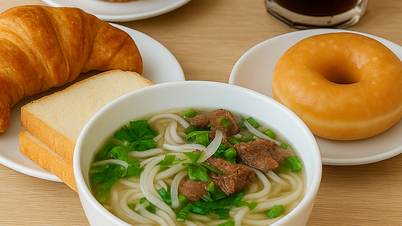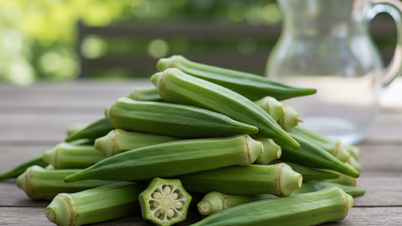If you have experienced food poisoning or are feeling unwell with a bloated stomach, choosing simple, easy-to-digest foods can help ease indigestion symptoms.

Cooked soft pumpkin is considered a nutritious, easy-to-digest food - Illustration photo
Experts recommend that easily digestible foods are low in fiber and fat. They are also mild in flavor, not acidic or spicy. Foods that are soft or easy to chew and swallow are easier to digest than those that are dry, tough, or hard.
Foods that are easy to digest take the strain off your digestive system. Digestion requires energy, including mechanical energy like chewing in your mouth and chemical energy like stomach acid and enzymes in your small intestine.
Choosing easily digestible foods when you are feeling unwell, have indigestion, or experience other digestive symptoms such as diarrhea can help give your digestive system a break. This helps your body not to work too hard during digestion.
Below are some easily digestible food groups, suitable when your stomach or intestines are having problems.
White flour products
Most people need to increase the amount of fiber in their diet, but if you're having trouble with your digestive system, it's a good idea to choose foods low in fiber.
High-fiber foods like whole grains can increase the amount of undigested food in your digestive tract and speed up bowel movements, which can be detrimental if you have symptoms like bloating and diarrhea.
Refined grain products like white rice, white bread, and white pasta have had their fiber removed. Temporarily choosing these low-fiber foods can give your bowels a break when you're having digestive upset.
Peeled, canned or stewed fruit
Some fruits that are high in fiber are harder to digest. The fiber in these fruits is often found in the skin and seeds. For example, raspberries are one of the fruits with the highest fiber content because of their large seeds.
Lower fiber fruits such as ripe bananas or melons may be more helpful for people with digestive problems such as nausea or diarrhea. Peeled apples or pears are also good options for people with digestive problems.
Softer fruits such as stewed plums or canned peaches are also good options. When buying canned fruit, choose whole pieces that are packaged rather than in syrup to limit added sugars.
Cooked vegetables thoroughly
Just like fresh fruit, raw vegetables are more difficult to digest than cooked vegetables. When vegetables are cooked, the plant cell walls become softer, and the components inside (such as starch) are more easily processed by the body's digestive enzymes, making them easier on the digestive system.
Some easily digestible vegetables:
Zucchini and pumpkin (seeds removed); spinach; potatoes (peeled); green beans; beets; carrots.
Soups, smoothies and pureed foods
The way foods are prepared can affect digestibility. Although texture changes (such as pureeing) do not reduce the fiber content, they can reduce the fiber particle size of plant foods, making them more digestible.
For example, raw kale is tough and difficult to chew, but when cooked and blended into soup, it becomes softer and easier to digest. Similarly, fibrous fruits like strawberries are also reduced in texture when blended, making them easier to digest.
Who should choose easily digestible foods?
There are many reasons to eat foods that are easy to digest. After surgery involving the digestive tract, the diet usually begins with soft, liquid foods, then moves to easily digestible foods before returning to a normal diet to reduce stress on the digestive system and aid recovery.
Additionally, this food is also helpful when experiencing symptoms such as bloating, nausea, vomiting, or diarrhea. People with conditions such as diverticulitis, gastritis, stomach ulcers, GERD, IBD, or are undergoing cancer treatment may also choose this diet.
Experts advise that when experiencing digestive symptoms, temporarily choosing easily digestible foods can be helpful. Well-cooked foods that are low in fiber and fat are often easier to tolerate.
However, it is not advisable to eat only easily digestible foods for too long, as this can lead to nutritional deficiencies and the formation of unhealthy eating habits.
Work with a gastroenterologist to determine the cause of your symptoms. Then consider meeting with a dietitian to develop a personalized meal plan that will both diversify your diet and control your symptoms.
Source: https://tuoitre.vn/cac-nhom-thuc-an-de-tieu-hoa-ban-nen-biet-2024112522422956.htm




![[Photo] Flooding on the right side of the gate, entrance to Hue Citadel](https://vphoto.vietnam.vn/thumb/1200x675/vietnam/resource/IMAGE/2025/10/28/1761660788143_ndo_br_gen-h-z7165069467254-74c71c36d0cb396744b678cec80552f0-2-jpg.webp)
![[Photo] Draft documents of the 14th Party Congress reach people at the Commune Cultural Post Offices](https://vphoto.vietnam.vn/thumb/1200x675/vietnam/resource/IMAGE/2025/10/28/1761642182616_du-thao-tai-tinh-hung-yen-4070-5235-jpg.webp)

![[Photo] National Assembly Chairman Tran Thanh Man received a delegation of the Social Democratic Party of Germany](https://vphoto.vietnam.vn/thumb/1200x675/vietnam/resource/IMAGE/2025/10/28/1761652150406_ndo_br_cover-3345-jpg.webp)



























![[Photo] President Luong Cuong attends the 80th Anniversary of the Traditional Day of the Armed Forces of Military Region 3](https://vphoto.vietnam.vn/thumb/1200x675/vietnam/resource/IMAGE/2025/10/28/1761635584312_ndo_br_1-jpg.webp)





































































Comment (0)